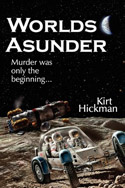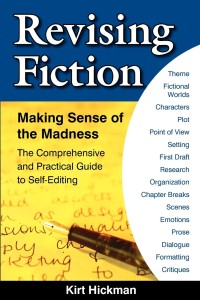by Kirt Hickman
Every scene must be shown from the viewpoint of one of your characters. In general, you should show the events from your hero’s point of view. The more you show from her viewpoint, the better your reader will get to know her and the more your reader will care about what happens to her. Choose an alternate viewpoint character when:
- Your hero isn’t in the scene.
- Another character is in the hot seat. Show the scene from the viewpoint of the character who has the most to lose if events go badly.
- You must convey some overwhelmingly important piece of information your hero doesn’t know.
Viewpoint Violations
Make sure your scenes don’t express something your viewpoint character wouldn’t know, like what’s happening someplace else or the cause of a phenomenon he doesn’t understand. Don’t express the thoughts, emotions, or motivations of other characters, except as they are interpreted by your viewpoint character.
When you must convey pure information, include only facts being observed, heard, or considered by your viewpoint character. Doing so makes the information immediate and important. If you provide information your viewpoint character is not experiencing, it creates either a viewpoint violation or a digression. Your reader will recognize both.
Viewpoint, however, is not just about what your character knows or doesn’t know. Your character’s viewpoint must permeate every aspect of your writing, from the portrayal of her thoughts and emotions, to setting descriptions, level of detail and specificity, narrative tone, and even your word choices.
To do this, you must know your character’s likes and dislikes, hobbies and interests, attitude, age, gender, ethnicity, socioeconomic circumstances, and background. The more you know about your character, the more real she will be to you and to your reader.
Setting
Describe your setting in a way that reveals your viewpoint character’s attitude and emotional state. Is the room cramped, or cozy? Is it cluttered, or lived in? Consider this passage:
General Chang reclined in the womb of his stronghold with his feet propped on the conference table.
What does the word womb tell you about how Chang feels when he’s in the control room of his stronghold? Later I describe this room from the perspective of my hero, who has been brought there as a prisoner. He’s not going to think of it as a womb. Your word choice must reveal the attitude and emotional state of your viewpoint character.
Let character viewpoint define how many and which details to include in your descriptions. A character who’s interested in architecture would drive down a street and notice the buildings. A character who’s more interested in cars would notice those. A cop looking for a suspect or informant would focus on the people.
When Chase, an accident investigator in my science fiction novel Worlds Asunder, approaches a crash site, he has time to take in the details that are important to his case:
Chase’s first view of the Phoenix was a mere glint of sunlight on the horizon. As he drew closer, the fuselage came into view, jutting skyward from the flat terrain like a solitary tombstone in a field of glittering metal. The effect gave a surreal beauty to the desolate scene.
The pod came to a stop at the boundary of the debris field. The ship was close now. The fuselage, largely intact, rested at an odd angle at the end of a long scar in the landscape. A debris field stretched out to the northwest. Dents and cracks that marred the hull suggested that the ship had tumbled into its final resting place. The aft section, the cargo hold, was mangled.
Chase not only notices the details but also assesses what they tell him about the crash. Contrast this with the following passage, which takes place during a gunfight inside the enemy stronghold:
Two terrorists moved before them as they wound their way through the labyrinthine passages. The defenders stopped at each intersection to fire a few odd rounds, which slowed Chase and his party, but the men never stayed in one place for long. Twice the terrorists fired through a window to bring down isolation doors and seal off part of the complex.
Here you get only a vague sense of passages, windows, and pressure doors. I left out the details because Chase has neither the time nor the inclination to notice them.
Vocabulary
Character viewpoint should also determine the language you use. People from different age groups, regions, countries, cultures, socioeconomic backgrounds, levels of education, time periods, and even genders speak differently. Write your narrative in your viewpoint character’s natural voice.
 Kirt Hickman is a technical writer turned fiction author. His books include three sci-fi thriller novels Worlds Asunder (2008), Venus Rain (2010) and Mercury Sun (2014), the high fantasy novel Fabler’s Legend (2011), and the writers’ how-to Revising Fiction: Making Sense of the Madness (2009).
Kirt Hickman is a technical writer turned fiction author. His books include three sci-fi thriller novels Worlds Asunder (2008), Venus Rain (2010) and Mercury Sun (2014), the high fantasy novel Fabler’s Legend (2011), and the writers’ how-to Revising Fiction: Making Sense of the Madness (2009).
This article was originally published in the July 2010 issue of SouthWest Sage and is reprinted here by permission of the author.



























Leave a Reply